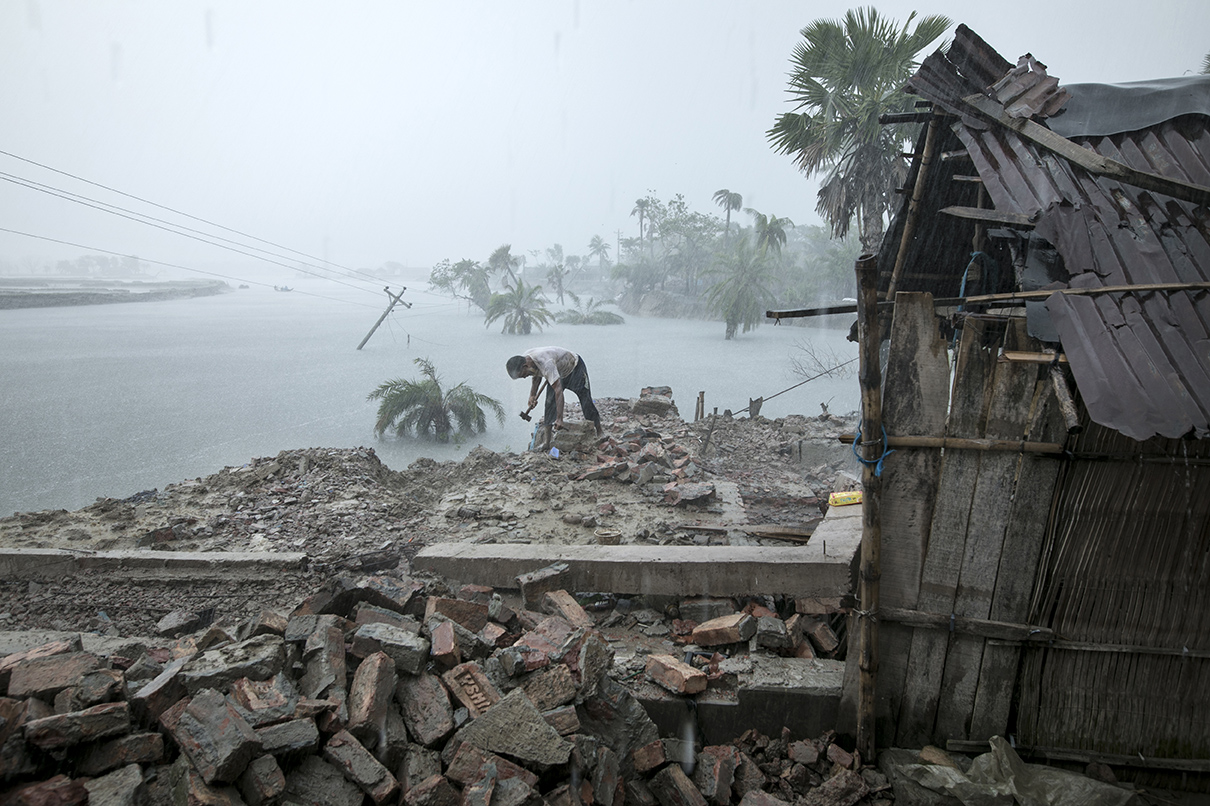Develop digital tools that will catalyse the next generation of climate-sensitive infectious diseases research
New funding call will support the development of digital tools that will catalyse the next generation of climate-sensitive infectious diseases (CSID) research.

Zakir Hossain Chowdhury
Three months after Cyclone Amphan hit Bangladesh, Habibur Rahman Sarder salvages anything still useful from the wreckage of his house. Like many others, Habibur remains homeless, taking shelter wherever possible. He has nowhere to cook and nowhere to grow crops, and medical treatment is hard to come by. Bangladesh’s coastal communities are severely at risk from climate change, with 20–25 million people predicted to be forced out of their homes by 2050.

At the heart of Wellcome’s strategy are three health challenges: mental health, infectious disease and climate and health, alongside our commitment to fund and support new discoveries in science and health.
Our health challenges do not exist in isolation.
Climate change has and will continue to have a profound impact on escalating infectious diseases. Warming temperatures are making new environments much more suitable for disease-carrying vectors, such as mosquitoes. It is predicted that this will put more than 1 billion people newly at risk of dengue, zika, chikungunya and many other diseases by 2080.
As a clinician based in the UK, I have never treated a single case of those diseases, but I expect global heating to change that within a few decades.
Huge amounts of investment will be needed to make sure healthcare systems around the world are ready for this radically shifting landscape – from adapting clinical training, to increasing resources to address new pressures.
Our new funding call will support the development of digital tools that will respond to these emerging threats and allow CSID modelling to be done more accurately, efficiently, and with greater downstream impact; for example, by better integrating CSID research into national and international policy.
There are vibrant communities already focusing on infectious disease research and climate science. However, opportunities for how they intersect are under-explored.
To better understand the opportunity for cross-disciplinary digital innovation, we commissioned the Inter-American Institute (IAI) for Global Change Research to undertake a landscaping exercise to identify what CSID-specific tools and technology already exist.
The IAI reviewed 9,500 pieces of published work but were only able to identify 37 (named) digital tools for CSID modelling.
There is clearly a great opportunity to support more foundational work in this space. We hope that the full report and the executive summary will serve as useful context for applicants.
1. Science needs to be led by the communities most affected
Most of the tools identified in the landscaping were developed for geographies where the infectious disease of interest was endemic. However, the developers were often not from those regions.
Instead, North American and European institutions were over-represented, and a third of the tools originated in the USA and UK alone.
Capacity building and mentoring are key to achieving greater representation of developers from the communities most impacted by CSID problems.
Wellcome has made a strategic shift towards actively pursuing diversity.
This will be reflected in how decisions are made for this call in-line with our active anti-racism principles, and how we think they apply to technology development across scientific fields.
2. We need to look beyond vector-borne diseases
Over 80% of the tools identified in the review focused on vector-borne disease systems. Half of those were specific to malaria.
Tools for respiratory, foodborne, and waterborne diseases were scarce, and there were no tools at all for soilborne diseases.
There is a clear opportunity to broaden the scope of what is available.
We would particularly like to support work that addresses under-invested modes of transmission, neglected (tropical) diseases, or even modelling that moves from pathogen-specific work to tools with multi-hazard relevance.
3. Technology alone isn’t enough
Stakeholder interviews identified that a lack of effective communication between modellers and policy makers often served as a barrier to implementing new technology.
Software development is wasted without investment in the enabling environment.
This includes everything from adequate reporting to facilitating replication and re-use, to ensuring model outputs are clearly presented and relevant. These are questions that can only be answered through meaningful engagement with end-users, and is something that we hope applicants will think carefully while preparing their proposals.
This call is the first in a series of funding opportunities from Wellcome’s Climate and Health and Data for Science and Health teams.
We’re looking forward to being able to share more about our other projects with you all soon.
In the meantime, to all those that decide to apply to this call, good luck!
New funding call will support the development of digital tools that will catalyse the next generation of climate-sensitive infectious diseases (CSID) research.